
NEM Foundation, the global cryptocurrency and blockchain platform, joined forces with telecommunications startup FIX Network to increase cell phone security and solve SIM card swap problems.
FIX Network, an Israeli and Lithuania based mobile telecom startup, is going to implement a blockchain-based security protocol Symbol from NEM to its existing mobile phone infrastructure to offer privacy, security and safety solutions for global SIM card users.
The new partnership allows applying the blockchain security protocol to prevent fraudulent activities. FIX Networks’ architecture allows mobile operators to offer services such as digital ID handling, cryptocurrency wallets, and personal data firewalls. With private keys stored on users’ SIM cards, the technology enables safe transaction signing by the SIM card itself, never exposing users’ private keys. According to Itamar Kunik, the CEO of FIX Network:
Private keys will play a critical role in securing our digital lives. We believe that the most practical way to store these keys is on users' SIM cards, to enable secure access to our digital lives wherever we go.
The startup, which aims to roll out secure and private mobile technologies globally, has launched mobile communication services in 186 countries. The company recently tweeted, that the first 10k of secure FIX ID SIM cards are already made.
Growing needs for cell phone security
The fraud exploits a mobile operator’s ability to port a phone number to a device with a different SIM. This occurs when someone’s phone number is transferred to another SIM card, that belongs to a scammer due to the unlawful manipulation of the mobile operator. It also includes cases where scammers use fake data to get a SIM card, issued for the same phone number as their target’s number.
Once the change is made, the original owner loses connection to the network, while scammers receive all its text messages and voice calls. Diverting the incoming messages opens an opportunity for fraudsters to complete the text-based two-factor authentification check that protects the most sensitive accounts.
Since phone numbers are universally available and no further hardware is required, phone number verification makes it globally accessible and relatively inexpensive solution to ensure security. However, with SIM swap numbers growing, additional means of protection could be an option to keep account safer.
Sponsored
